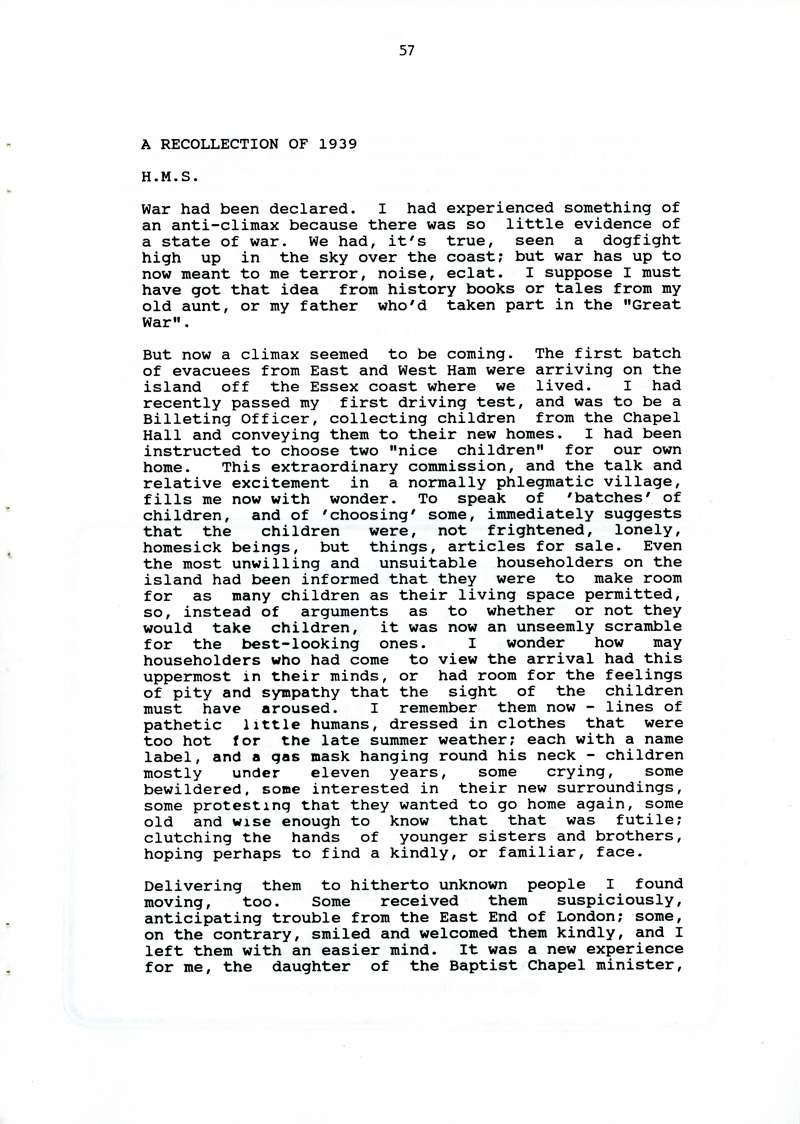|
Search for Image ID ""
Mistral. Journal of the Mersea Island Society. January 1991. Page 57.
War had been declared. I had experienced something of an anti-climax because there was so little evidence of a state of war. We had, it's true, seen a dogfight high up in the sky over the coast; but war has up to now meant to me terror, noise, eclat. I suppose I must have got that idea from history books or tales from my old aunt, or my father who'd taken part in the "Great War". But now a climax seemed to be coming. The first batch of evacuees from East and West Ham were arriving on the island off the Essex coast where we lived. I had recently passed my first driving test, and was to be a Billeting Officer, collecting children from the Chapel Hall and conveying them to their new homes. I had been instructed to choose two "nice children" for our own home. This extraordinary commission, and the talk and relative excitement in a normally phlegmatic village, fills me now with wonder. To speak of 'batches' of children, and of 'choosing' some, immediately suggests that the children were, not frightened, lonely, homesick beings, but things, articles for sale. Even the most unwilling and unsuitable householders on the island had been informed that they were to make room for as many children as their living space permitted, so, instead of arguments as to whether or not they would take children, it was now an unseemly scramble for the best-looking ones. I wonder how may householders who had come to view the arrival had this uppermost in their minds, or had room for the feelings of pity and sympathy that the sight of the children must have aroused. I remember them now - lines of pathetic little humans, dressed in clothes that were too hot for the late summer weather; each with a name label, and a gas mask hanging round his neck - children mostly under eleven years, some crying, some bewildered, some interested in their new surroundings, some protesting that they wanted to go home again, some old and wise enough to know that that was futile; clutching the hands of younger sisters and brothers, hoping perhaps to find a kindly, or familiar, face. Delivering them to hitherto unknown people I found moving, too. Some received them suspiciously, anticipating trouble from the East End of London; some, on the contrary, smiled and welcomed them kindly, and I left them with an easier mind. It was a new experience for me, the daughter of the Baptist Chapel minister, brought up apart from "the world", as it was known in chapel language, deliberately kept away from others of my age and from families that were "worldly", to be knocking on the doors of numbers of such people and talking to them now, when otherwise I should never have spoken to them in a lifetime. War, then, was overriding, like some great emotion not to be denied, and my allegiance to a narrow religion, devoted and extremely conscientious as I was, paled before it.[ The last paragraph was from the following page. ] H.M.S. was Helen Searle - see MIS_2002_010 Date: January 1991 Image ID MIS_1991_067 Category 2 War-->World War 2 | ||
Top | This image is part of the Mersea Museum Collection. |




